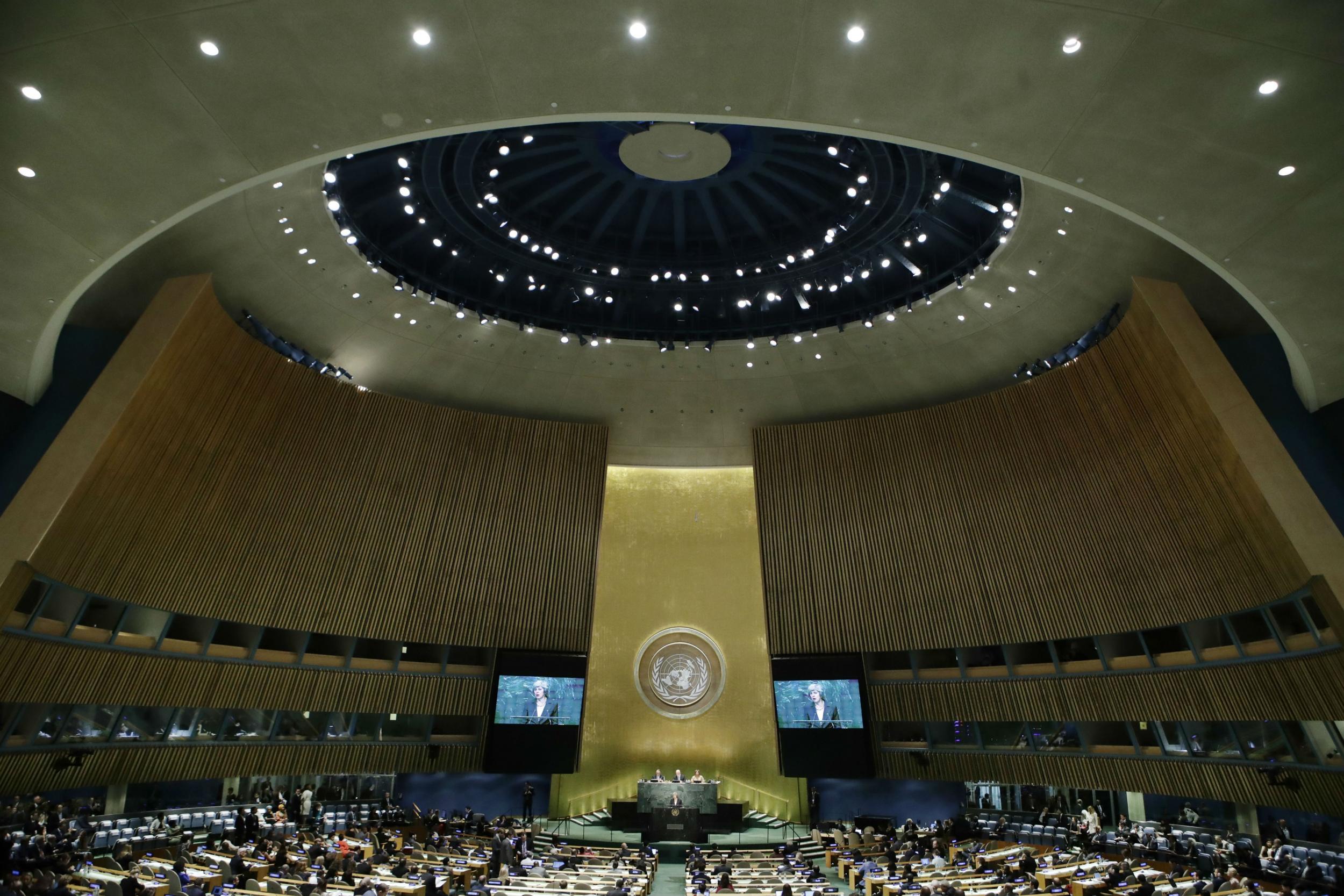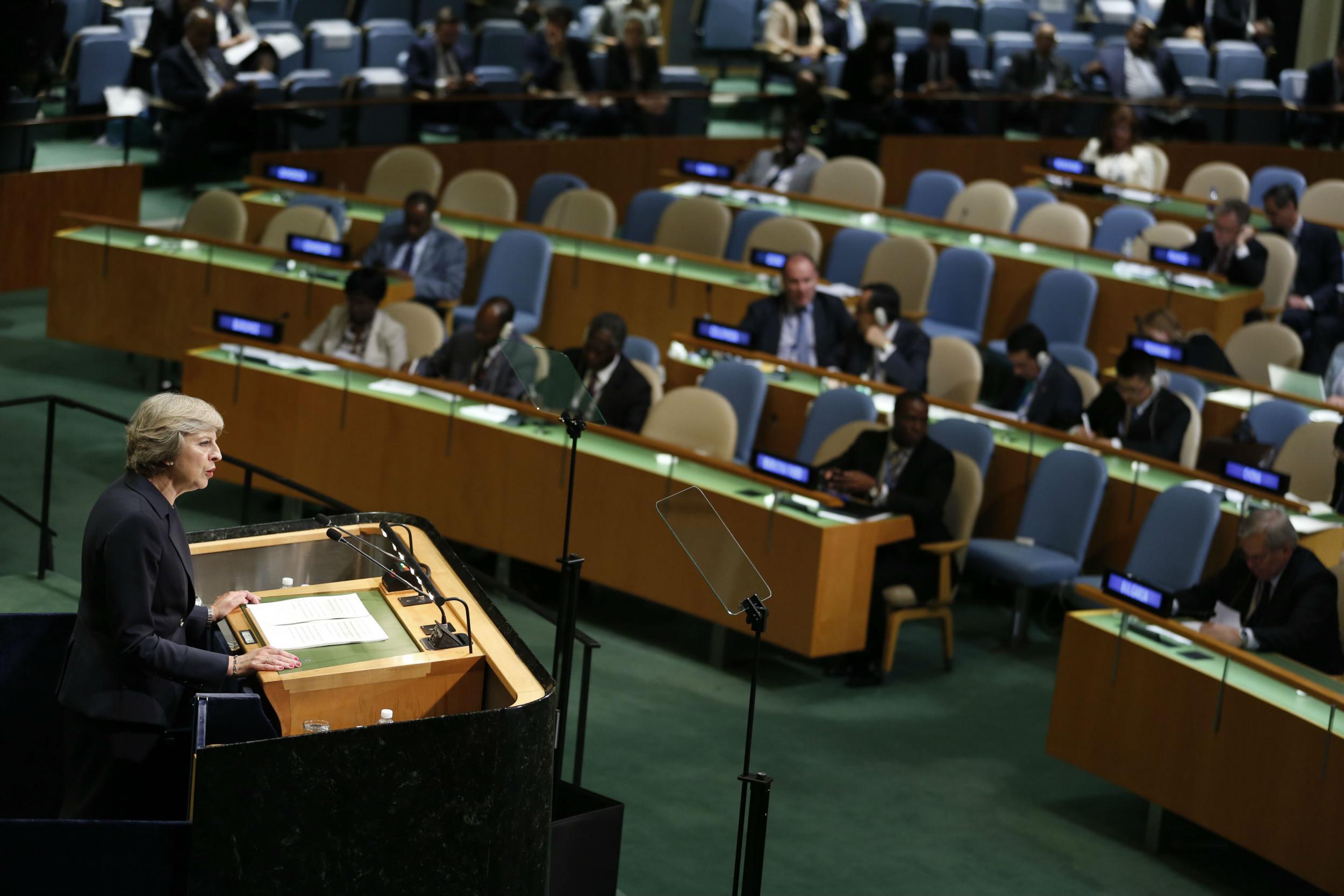Theresa May tells UN the UK will not turn inwards after Brexit vote
The Prime Minister was delivering her maiden address to the assembly in New York
Your support helps us to tell the story
From reproductive rights to climate change to Big Tech, The Independent is on the ground when the story is developing. Whether it's investigating the financials of Elon Musk's pro-Trump PAC or producing our latest documentary, 'The A Word', which shines a light on the American women fighting for reproductive rights, we know how important it is to parse out the facts from the messaging.
At such a critical moment in US history, we need reporters on the ground. Your donation allows us to keep sending journalists to speak to both sides of the story.
The Independent is trusted by Americans across the entire political spectrum. And unlike many other quality news outlets, we choose not to lock Americans out of our reporting and analysis with paywalls. We believe quality journalism should be available to everyone, paid for by those who can afford it.
Your support makes all the difference.Theresa May has vowed that controlling Britain’s borders and reducing the flow of immigrants will dominate her government as the UK seeks a new place in the world after voting to leave the EU.
But in her first address to the UN General Assembly, the British Prime Minister said the UK would not turn away from the world and would remain at the heart of international affairs. She also pledged hundreds of million of pounds in aid spending to tackle terrorism and to stop hundreds of thousands of migrants travelling to Europe.
To underline her message, she called for global network of crime-fighting agencies to tackle international modern slavery and emphasised the UK's spending on international aid and defence.
She also warned leaders not to forget the masses of people affected by globalisation, a lesson the UK has been taught following the EU referendum, and an open wound that the US presidential election has further exposed here.
“The United Kingdom has always been an outward-facing, global partner at the heart of international efforts to secure peace and prosperity for all our people,” she said.
“And that is how we will remain. For when the British people voted to leave the EU, they did not vote to turn inwards or walk away from any of our partners in the world.”

She added: “Faced with challenges like migration, a desire for greater control of their country, and a mounting sense that globalisation is leaving working people behind, they demanded a politics that is more in touch with their concerns; and bold action to address them.”
In advance of her speech in New York, the Prime Minister’s Office had said she would try to counter concerns that the June referendum had sparked among Britain’s traditional allies. President Barack Obama had warned that Britain could expect no special treatment and would be at the “back of the line” in any trade deals.
At a strategic level, those allies fear Britain's exit from the EU could mark a turning point in post-Cold War international affairs that will weaken the West in relation to China and Russia, undermine efforts toward European integration and hurt global free trade.
Britain retains its role in the NATO military alliance as the EU’s biggest defence spender, its permanent veto-wielding seat on the UN Security Council and four submarines armed with nuclear ballistic missiles, Reuters said.
But Ms May, who was herself a reluctant member of the Remain camp, made clear she had no plan to stand back from the mandate delivered by the EU to better control migration.

“Just as we need the United Nations to modernise to meet the challenges of terrorism in the 21st century, so we also need to adapt if we are to fashion a truly global response to the mass movements of people across the world and the implications this brings for security and human rights,” she said.
The Prime Minister said that Britain would spend £750m in aid funding to help tackle the migrant crisis. An extra £660m of the aid budget would be diverted to focus on humanitarian relief - with much of the money expected to be used to support the refugees driven out of Syria.
A further £80m will be spent on helping migrants stay in Africa, with the country being one of the main sources of people attempting to reach Europe. Her officials said Britain would increase its security support for Somalia to help fight Al Shabaab militants. One official said 30 training teams will be deployed with up to 70 troops at a time.
“But in addition to refugees and displaced people fleeing conflict and persecution, we are also seeing an unprecedented movement of people in search of greater economic opportunities through the same unmanaged channels,” she said.
“This affects all of us, and it is the responsibility of us all to take action. We cannot ignore this challenge, or allow it to continue unmanaged. We need to do better. Better for the countries people leave, for the countries they move through, for the countries they try to get to – and most of all, better for the migrants and refugees themselves.”
Ms May’s address was not a rousing piece of oratory, and many delegates in the hall chatted as she spoke - a rudeness not endured by her alone. The South African team handed round candies from a tin, while Foreign Secretary Boris Johnson, seated with the rest of the UK delegation, spent much of the speech sending messages on his phone.
Yet the Prime Minister carried on unfazed.
“This is not the time to turn away from our United Nations. It is the time to turn towards it,” she concluded. “Only we - as members of this community of nations - can act to ensure this great institution becomes as relevant for our future as it has been in our past.”

Join our commenting forum
Join thought-provoking conversations, follow other Independent readers and see their replies
Comments